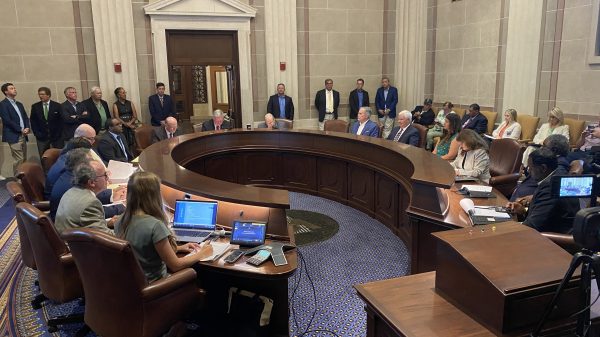By John McMillan
The numbers tell the story: $70.4 billion. That’s the sum total of the economic impact of agriculture, agribusiness and forestry on Alabama’s economy.
Bear in mind, each year, Alabama’s economy generates $188.3 billion in goods and services, 37% of which comes from farming, forestry and agribusinesses. Among Alabama workers, two in five rely on farming, forestry and agribusiness for their livelihood.
The past decade has been a relatively good time for farmers as commodity prices –
including: poultry, beef, cotton, corn, peanuts, soybeans and wheat – have reached and stayed at or near record highs. Of course, offsetting these higher prices are costs such as energy, fertilizer and land, which have all trended higher in recent years.
The 21st century has seen the surging economies of India and China resulting in greater demand for Alabama farm products. Each year, we export billions in poultry, cattle, cotton, soybeans and peanuts to Asian markets. Alabama farm communities, as a result, are more prosperous.
Despite the Great Recession that lingers in some areas of the state, Alabama agriculture has prospered, creating jobs and opportunity. However, the overall economy has struggled. In 2012, when the U.S. gross domestic product (GDP) grew at an anemic rate of 2.5%, Alabama turned in a growth rate of less than half, at 1.2%.
This year, several economic indicators tell us that better times are ahead in Alabama:
- Our unemployment rate is coming down to 6.5%, versus 10.5% in 2009
- Business confidence is on the rise, forecasting business expansion, hiring and profitability.
- Automakers in Alabama continue to build more cars and announce plans to expand operations.
- Alabama is scoring big in industrial relocations, including Airbus Aircraft and Austal Shipbuilding, creating thousands of new jobs in the Mobile area.
- Alabama’s rate of economic growth or GDP is expected to nearly double this year to 2.2%.
We have a strong economic base in Alabama, especially in agriculture and manufacturing, which should generate jobs and opportunity for thousands of Alabamians and small businesses for the foreseeable future.
Yet, it’s not wise to rely on the status quo to sustain us, especially in today’s highly competitive international marketplace. Two years ago, our department joined the campaign for ratification of free trade agreements between the United States and three nations: Colombia, South Korea and Panama. Thanks to bipartisan efforts in Congress, these trade agreements passed overwhelmingly and President Obama signed them into law.
It is now time for us to focus on how Alabama companies can take advantage of these open markets. Thanks to support from many of our stakeholder companies, we held a symposium in late 2011 on world food outlook and how Alabama agriculture can respond to the burgeoning demand for food and fiber.
By the year 2050, world population will reach 9 billion, including two billion more people joining the middle class. Most of the middle income growth will occur in China and India. The American farmer has an incredible opportunity to meet what will be a 50% increase in world food demand, much of which will be protein, such as meat, poultry and grains. Alabama will play a large role in this, as we are the nation’s third largest poultry producer. Our Alabama poultry producers this year are well ahead of last year’s production levels, with some 25 million new chickens added each week to the state’s poultry population. It is worth noting that Alabama cattle and grain production also are in great demand.
There is more to growing our economy than agricultural output. We have a significant agricultural and forestry related industrial base that provides significant benefits. Total value-added impact for the agriculture, forestry and related industries sector of Alabama’s economy totals $30.8 billion a year, according to a recent study conducted by Auburn University’s Department of Agricultural Economic and Rural Sociology.
This sector has great potential for Alabama’s economic future, supported by our land grant colleges that provide the research and development resources necessary for growth.
We have a very good working relationship and strong leaders among our agricultural and forestry stakeholder groups along with out land grant colleges upon which we are building our future. Our focus is clear and our challenges are formidable. Fortunately, all of us are moving in the same direction.
John McMillan is Commissioner of Alabama’s Department of Agriculture & Industries. You can write him at [email protected].




















































